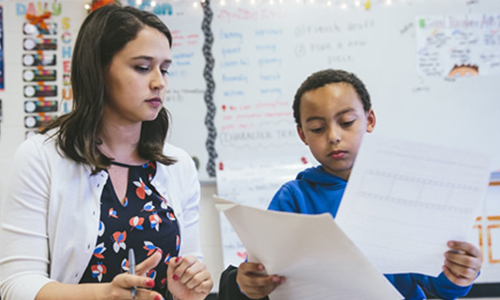

In this study, we examine seasonal patterns of racial/ethnic achievement gaps in kindergarten through eighth grade using a national sample of over two million students.
By: Megan Kuhfeld, Dennis Condron, Douglas Downey


Trends in children’s academic skills at school entry: 2010 – 2017
This study examines academic skills at kindergarten entry from 2010 and 2017 using data from over 2 million kindergarten students. Results indicated kindergarteners in 2017 have slightly lower math and reading skills than in 2010, but that inequalities at school entry by race/ethnicity and school poverty level have decreased during this period.
By: Megan Kuhfeld, James Soland, Christine Pitts, Margaret Burchinal
Topics: Equity, Early learning


The relationship between test-taking disengagement and performance on MAP Growth retests
Educators sometimes ask: do students rapidly guess because they don’t know the answer to a question, or do rapid guesses reflect a lack of engagement with the test? Would a student’s scores improve if that student engaged more with the assessment and rapidly guessed on fewer items? Examining MAP® Growth™ test scores and levels of student test engagement for over 100,000 tests for which students retested within one day, the results showed that students’ test taking engagement often differed between the initial test and the retest.
By: Steven Wise
Topics: School & test engagement


In this study, we apply the Compound Polynomial or “CP” model in a school evaluation context. The CP model addresses the seasonality of student test scores by simultaneously estimating between- and within-year growth.
Topics: Growth modeling, Seasonal learning patterns & summer loss, Student growth & accountability policies


Reconciling long-term education policy goals with short-term school accountability models
Schools are increasingly held accountable for their contributions to students’ academic growth in math and reading. Under The Every Student Succeeds Act, most states are estimating how much schools improve student achievement over time and using those growth metrics to identify the bottom 5% of schools for remediation.
Topics: Measurement & scaling, Growth modeling, Student growth & accountability policies


Seven successful strategies for literate assessment
Beth Tarasawa and colleagues share research-based assessment practices that support classroom learning.
By: Beth Tarasawa
Topics: Empowering educators


Student test engagement and its impact on achievement gap estimates
In this Brookings Institute Chalkboard blog, James Soland shares his work investigating how student test engagement may shape achievement gaps.
By: James Soland
Topics: School & test engagement, Student growth & accountability policies


